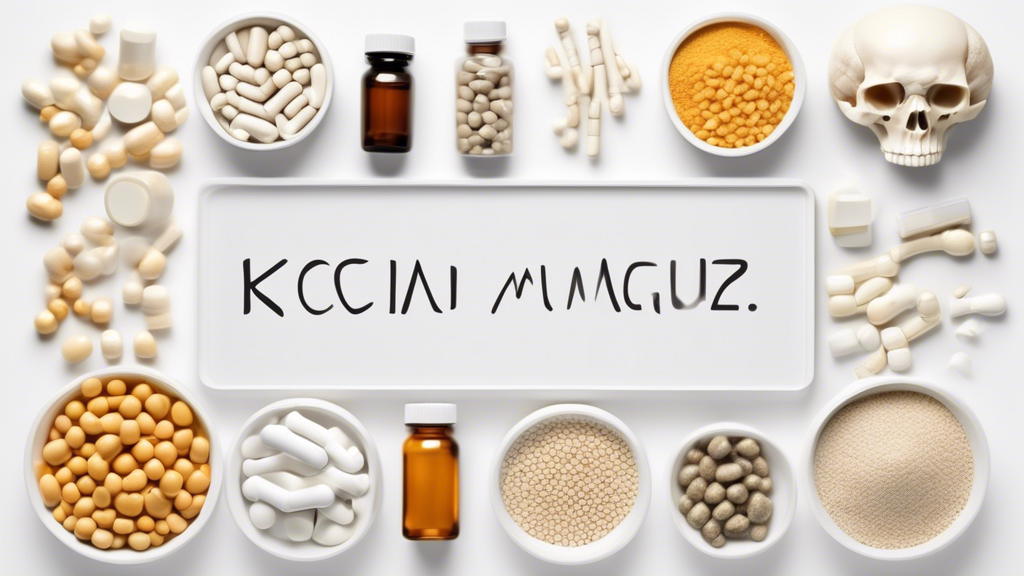Best Supplements for Bone Strength
Key Takeaways
Maintaining bone strength and preventing osteoporosis is crucial for overall health. This article delves into the top supplements recommended for bone health, including Calcium, Vitamin D, Magnesium, Vitamin K2, Collagen, and Omega-3 fatty acids. Understanding their roles, optimal sources, and dosages can significantly contribute to robust bone health.
Calcium: The Building Block of Bones
Calcium is essential for the development and maintenance of strong bones. It is the primary mineral found in teeth and bones, comprising about 99% of the body’s calcium reserve.
Sources and Dosages
Dairy products, leafy green vegetables, and fortified foods are excellent dietary sources of calcium. However, many people do not get enough calcium through diet alone and might benefit from supplementation. The recommended daily intake for adults is around 1,000 to 1,200 mg, depending on age and sex.
Choosing the Right Supplement
Calcium supplements are available in various forms, such as calcium carbonate and calcium citrate. Calcium carbonate should be taken with meals to ensure better absorption, while calcium citrate can be taken with or without food and is often recommended for older adults or those with low stomach acid.
Vitamin D: Enhancing Calcium Absorption
Vitamin D plays a crucial role in calcium absorption and bone metabolism. Without sufficient Vitamin D, the body cannot absorb the necessary amount of calcium, regardless of intake.
Sources and Dosages
The body synthesizes Vitamin D when exposed to sunlight, but it can also be obtained through fatty fish, liver, and fortified foods. The recommended daily allowance ranges from 600 to 800 IU, though some experts suggest higher doses, especially for individuals at risk of deficiency.
Choosing the Right Supplement
Vitamin D supplements are typically available as Vitamin D2 (ergocalciferol) or Vitamin D3 (cholecalciferol), with D3 being more effective at raising blood levels. It’s crucial to follow a healthcare provider’s advice for optimal dosage.
Magnesium: Facilitating Bone Mineralization
Magnesium is another vital mineral that supports bone health by facilitating the conversion of Vitamin D into its active form and enhancing calcium absorption.
Sources and Dosages
Foods rich in magnesium include nuts, seeds, whole grains, and green leafy vegetables. The recommended dietary allowance for adults ranges from 310 to 420 mg daily, depending on age and sex.
Choosing the Right Supplement
Magnesium supplements come in various forms, such as magnesium oxide, citrate, and glycinate. Magnesium citrate and glycinate are more readily absorbed and less likely to cause digestive issues compared to magnesium oxide.
Vitamin K2: Directing Calcium to Bones
Vitamin K2 is essential for directing calcium to the bones and teeth where it is needed, preventing it from depositing in the arteries and soft tissues.
Sources and Dosages
Vitamin K2 is found in fermented foods like natto, as well as in meat and cheese. The optimal daily intake is not well-established but generally ranges from 90 to 120 mcg for adults.
Choosing the Right Supplement
K2 is available as MK-4 and MK-7, with MK-7 being more commonly used due to its longer half-life, ensuring steadier blood levels. Consulting a healthcare provider is advisable to determine the appropriate dosage.
Collagen: Providing Structural Support
Collagen is a protein that provides structural support to bones, tendons, and skin. It plays a role in maintaining bone flexibility and strength.
Sources and Dosages
Collagen can be obtained from bone broth and certain meat cuts. However, collagen supplements, such as hydrolyzed collagen peptides, are more effective for improving bone health as they are easier to absorb. Typical dosages range from 2.5 to 15 grams per day.
Choosing the Right Supplement
Hydrolyzed collagen peptides are the most bioavailable form, meaning they are broken down into smaller particles for easier digestion and absorption. Supplements are often derived from bovine, porcine, or marine sources, with marine collagen being particularly effective due to its high absorption rate.
Omega-3 Fatty Acids: Inhibiting Bone Breakdown
Omega-3 fatty acids are essential fats that play a role in reducing inflammation and inhibiting bone breakdown, promoting overall bone health.
Sources and Dosages
Omega-3s can be found in fatty fish like salmon, mackerel, and sardines, as well as in flaxseeds, chia seeds, and walnuts. The American Heart Association recommends consuming at least two servings of fatty fish per week, which equates to around 500 mg of EPA and DHA daily.
Choosing the Right Supplement
Fish oil supplements are a popular way to increase omega-3 intake. When selecting a supplement, look for those that provide a combined total of EPA and DHA near the recommended intake. It’s also beneficial to choose products that have been third-party tested for purity and potency.
Additional Tips for Bone Health
Balanced Diet
A balanced diet rich in fruits, vegetables, lean protein, and whole grains can naturally support bone health. Foods such as milk, cheese, broccoli, and kale are great for bone strength due to their high calcium content.
Regular Exercise
Engaging in weight-bearing exercises, like walking, running, and resistance training, can help maintain bone density. Incorporating activities like yoga and pilates can also improve balance and coordination, reducing the risk of falls and fractures.
Avoid Excessive Alcohol and Smoking
Both excessive alcohol consumption and smoking can adversely affect bone health. Limiting alcohol intake and quitting smoking are crucial steps toward maintaining strong bones.
Conclusion
Supplementation can be an effective approach to ensuring adequate intake of essential nutrients for bone health. Calcium, Vitamin D, Magnesium, Vitamin K2, Collagen, and Omega-3 fatty acids each play unique roles in maintaining and enhancing bone strength. While dietary sources are ideal, supplements can fill nutritional gaps, especially when dietary intake is insufficient. As always, consult with a healthcare provider before beginning any new supplement regimen to ensure it meets your specific health needs.

